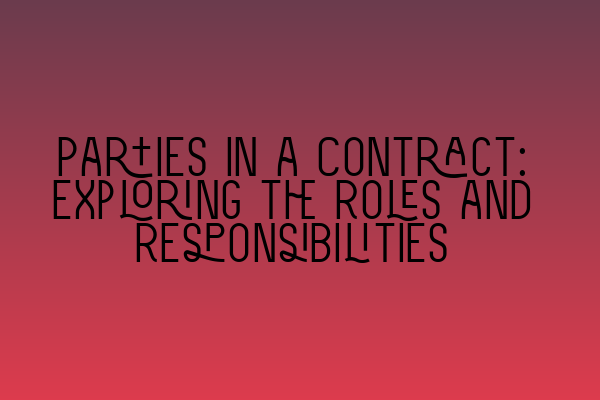Parties in a Contract: Exploring the Roles and Responsibilities
Contracts are essential for establishing legally binding agreements between parties. Whether you’re a business owner, employee, or individual entering into a transaction, understanding the roles and responsibilities of the parties involved is crucial. In this blog post, we will delve into the different parties in a contract and the obligations they hold.
1. The Offeror:
The party who initiates the contract by presenting an offer is known as the offeror. They outline the terms and conditions they are willing to abide by, setting the framework for the contract. The offeror must ensure that their offer is clear, specific, and communicated to the offeree (the party to whom the offer is made) in a reasonable manner.
2. The Offeree:
The offeree is the party who receives the offer from the offeror. They have the power to accept or reject the offer presented to them. When the offeree accepts the offer, it becomes a legally binding contract. However, the offeree can also propose a counteroffer, introducing new terms or modifying existing ones. It’s important to note that a counteroffer terminates the original offer and creates a new negotiation process.
To better understand the concepts of offer and acceptance, check out our article on SQE 1 Practice Exam Questions.
3. Consideration:
Consideration refers to something of value that each party promises to give or do in exchange for the other party’s promise. It is an essential element of a valid contract. Consideration can take various forms, such as money, property, services, or even a promise to refrain from doing something. Without consideration, a contract may be deemed unenforceable.
4. Intention to Create Legal Relations:
For a contract to be legally binding, there must be an intention to create legal relations. This means that both parties must understand and agree that their agreement carries legal consequences. Contracts entered into for social or domestic purposes generally lack this intention, making them unenforceable in a court of law.
5. Capacity:
Ensuring that both parties have the legal capacity to enter into a contract is crucial. Capacity refers to an individual’s legal ability to understand the terms and consequences of a contract and to fulfill their obligations. Minors, individuals with mental incapacity, and those under the influence of drugs or alcohol may lack capacity and their contracts may be voidable.
If you’re interested in learning more about contract law and capacity, head over to our comprehensive SQE 2 Preparation Courses.
6. Legal Purpose:
A contract must have a legal purpose to be enforceable. The agreement cannot involve any illegal activities, such as fraud, gambling, or any other illegal conduct. If a contract includes an illegal provision, it may be deemed void, and neither party can enforce its terms.
7. Privity of Contract:
The concept of privity of contract determines the extent to which a third party can enforce the terms of a contract. Generally, only the parties who originally entered into the contract have rights and obligations. However, there are certain exceptions, such as assignments and novations, where a third party gains rights or obligations under the contract.
For more information about contracts and privity, take a look at our dedicated SQE 1 Practice Mocks FLK1 FLK2.
Understanding the roles and responsibilities of the parties involved in a contract is crucial for ensuring that agreements are legally binding and properly enforced. By familiarizing yourself with the intricacies of offer and acceptance, consideration, capacity, legal purpose, and privity of contract, you can navigate the world of contracts with confidence.
If you’re preparing for the SRA SQE exams, make sure to check out our comprehensive SQE 1 Preparation Courses. Stay up to date with the latest SRA SQE Exam Dates and give yourself the best chance of success.
For any additional help or guidance regarding contract law and the roles of parties in a contract, don’t hesitate to contact SQE Contract Law. We’re here to provide expert legal support tailored to your specific needs.
